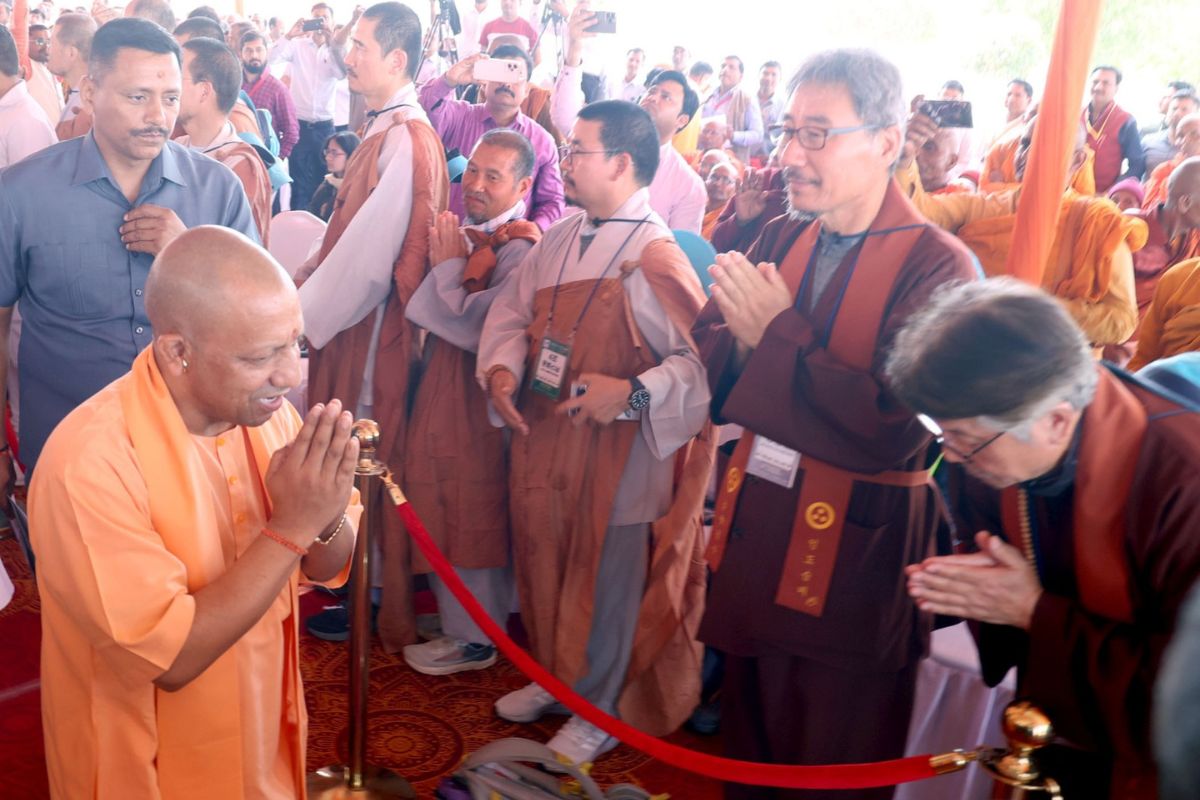Even as the diplomatic relations between India and South Korea have completed half a century, the spiritual ties between the two countries go back to ancient times. India is not ‘foreign’, but ‘home’ to spiritual ancestors of the Koreans, said Uttar Pradesh Chief Minister Yogi Adityanath.
Yogi Adityanath participated in the felicitation ceremony of the Jogye Sangh on Wednesday on the successful completion of the 43-day ‘padyatra’ of the Buddhist pilgrimages by the Jogye Sangh of South Korea on the occasion of completion of the half-centenary of diplomatic relations between India and South Korea.
Advertisement
Speaking on the occasion, he said Lord Gautam Buddha had started his Dhamma Yatra from Sarnath by giving his first sermons. “I congratulate you for completing your 43-day pilgrimage,” he said, adding that the padayatra is being organised to strengthen the relations between the two countries on the occasion of the completion of half a century of diplomatic relations between India and South Korea.
When saints make efforts to deepen the relations, then its meaning becomes divine, said the CM. Citing history, he said that Korea’s Buddhist Jogye Sangha has its roots in India.
The Buddha’s tradition of meditation entered Korea through his disciple Huineng in China. “Shravasti, the origin of your meditation tradition Seon, is where your journey came to an end. In this sense, you have not come abroad but to the home of your spiritual ancestors,” Yogi said.
The group of monks travelled on foot along the entire Buddhist circuit including Lumbini, Nepal, the birthplace of Lord Buddha, to Kushinagar, the place of Mahaparinirvana.
Furthermore, Yogi said: “Both India and South Korea celebrate independence on August 15. India got the opportunity to chair the G-20 summit in its ‘Azadi ka Amrit Kaal’. This year the theme of G-20 is ‘One Earth, One Family, One Future’, it connects us with the spirit of India’s ‘Vasudhaiva Kutumbhakam’.”
As earlier declared by PM Modi at the UN, India gave Lord Buddha to the entire world. Buddha’s preaching inspires the entire mankind to embrace friendship, oneness, compassion, and humility. India is the centre of reverence and faith for the Buddhist society of the world, added the CM.
He went on to say that many places associated with the life of Mahatma Buddha are in Uttar Pradesh, India. Lord Buddha had given his first sermon in Sarnath, in Shravasti he spent most of his ‘varshavaas’ and Kushinagar is his place of Mahaparinirvana.
“Lucknow is surrounded by the aura of Lord Buddha from all sides. Shanti Upvan Buddha Vihar is in UP, International Buddhist Research Institute in our state. As international airport has become operational in Kushinagar, the development of an airport in Shravasti is also going on war footing. The state government is going to set up an agriculture and technology university named after Mahatma Buddha in Kushinagar itself. The relations between India and South Korea are scaling new heights under the leadership of PM Modi,” he said.
The chief minister further said that in 2018, the mobile phone manufacturing unit of Samsung Electronics was also jointly inaugurated in the district of Gautam Buddha Nagar. The mutual trade between India and South Korea is $28 billion in which India exports goods worth $9 billion and imports worth $19 billion from South Korea.
About 108 Buddhist pilgrims from the Republic of Korea walked over 1,100 kms over 43 days as part of a walking pilgrimage being organized by the Sangwol Society of South Korea. The occasion gains importance as India and South Korea celebrate 50 years of establishment of diplomatic ties. The pilgrimage aimed to increase friendship and collaboration between the two countries. The tourists visited Buddhist pilgrimage sites in the country.
